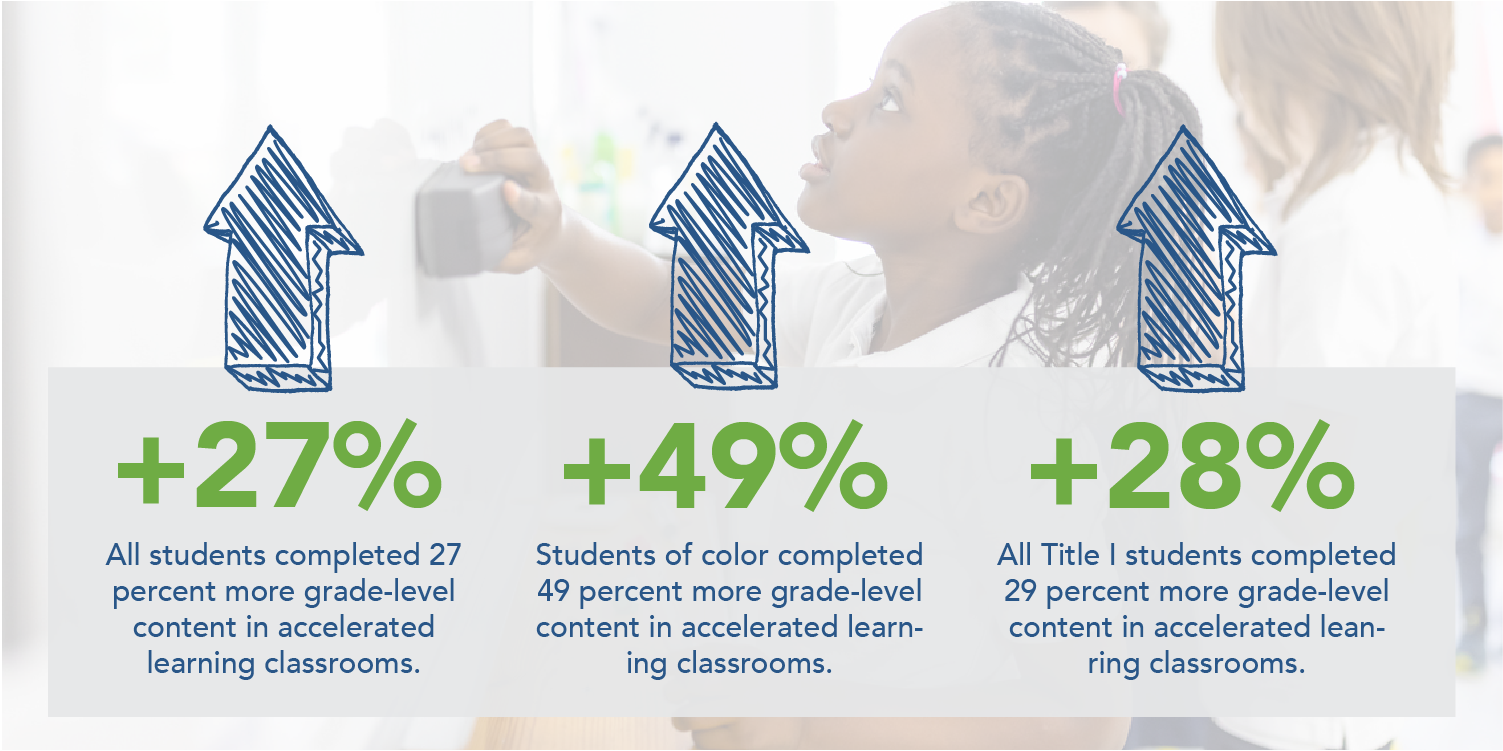How School Leaders Can Improve Student Outcomes with Learning Acceleration
Though there hasn’t always been a universally-accepted name for the method, accelerated learning has existed in the education landscape for generations. But never before has the need to usher students to grade-level content been more urgent. After COVID swept schools with mass hardship, district leaders took a magnifying glass to evidence-based strategies to mitigate unfinished learning.
During remote instruction, young people lost 35% of a school year’s worth of learning. Learning gaps stand to last years beyond the pandemic’s expiration date. For school leaders tasked with improving academic outcomes, this situation demands district-wide accelerated learning strategies that ignite transformational and sustainable improvements.
Accelerated Learning: Exploring Options and Student Outcomes ›
Learning acceleration’s pedagogical rival has long been remediation. Remediation practices have continued in some schools across the country despite more favorable outcomes from learning acceleration. In fact, data compiled in a recent Zearn report reveals that students in accelerated learning classrooms complete 27 percent more grade-level assignments than their peers without access to the method.
Academic learning acceleration includes a wide variety of educational and instructional strategies educators use to advance the learning progress of all students regardless of where they are in their learning trajectory. Acceleration prepares students for success with upcoming new learning and lays the foundation for continued academic growth. Remediation, on the other hand, delays opportunities to learn new content until students have mastered all missing skills and concepts, leaving them further and further behind their grade-level peers.
Though some logic might suggest a step-by-step mastery of material is what moves students forward, students are actually more at risk of being left behind the longer that remedial content replaces new grade-level content and learning.
Data from more than two million students in over 100,000 elementary classrooms shows learning acceleration has improved learning outcomes even in the most underserved and disadvantaged student populations.

Accelerated Learning Strategies at Work
Alejandra Pinto Rice has spent the better part of two decades enhancing educator effectiveness, perfecting teacher evaluation methods, creating and delivering professional development, and designing adult learning systems.
Like so many education professionals who aspire to teach for the greater good, Alejandra began her journey in a single classroom. “Everyone knew I was going to become an educator. Everyone except me,” she says.
Her calling to classroom work happened in light of community needs. When Bryan, Texas’ fast-growing English language learner community required a bilingual teacher, Alejandra stepped in.
Over the course of eleven years, Alejandra earned her alternative certification, taught kindergarten through second grade, developed the area’s first 90:10 model for dual language immersion, and became a principal.
“I knew I could impact more positive change for students if I had a hand in developing learning materials, so I became a literacy coach, a teacher leader, and after I got my Masters’ degree in curriculum development, I began developing the most effective lessons for our specific community of students.”
Alejandra’s accelerated learning strategies paid off in both the short term and over the long haul. As a teacher, her English language learners absorbed content faster, retained more information, and moved on to grade-specific objectives without getting stuck. On the other hand, in her role as curriculum designer and consultant, the work she did to implement learning acceleration created a positive impact for ELLs who would feel disproportionate effects of COVID’s learning loss in future years.
Alleviating Accelerated Learning Concerns
Change is hard–especially when there is so much at stake. “Teachers understandably feel hesitant to alter any existing progress,” says Alejandra. In fact, some individual classroom teachers oppose accelerated learning altogether.
“Most teachers want to see the results before they make the time investment or agree to alter their existing lesson plans. That hesitance is apparent in almost any shift or disruption in classroom protocols. Really, that desire to make data-driven decisions is a trait that educators and school leaders share.”
“It’s crucial for every education professional to understand that accelerated learning focuses on enhancing what already works well, not altering any foundational learning systems. We always validate the teacher's hard work. We take small steps toward change until a transformation happens in how efficiently their students catch up.”
To Alejandra, learning acceleration serves as the most teacher-friendly method in today’s pedagogical reservoir. “We work through the lens of a teacher’s current mission and their district’s vision, and we figure out how accelerated learning functions within that framework,” she says.
Accelerated learning builds a bridge connecting missed learning objectives with grade-level content and in turn increases engagement and ensures opportunities for optimal learning–no matter what obstacles students face in their learning journey.
About Insight Education Group
For more than 20 years, Insight Education Group has partnered with district leaders to ignite organizational change through targeted and customized approaches that help districts accelerate learning. We provide learning acceleration support that gives all students access to grade-level content–even those who have fallen significantly behind on their achievement trajectory.
